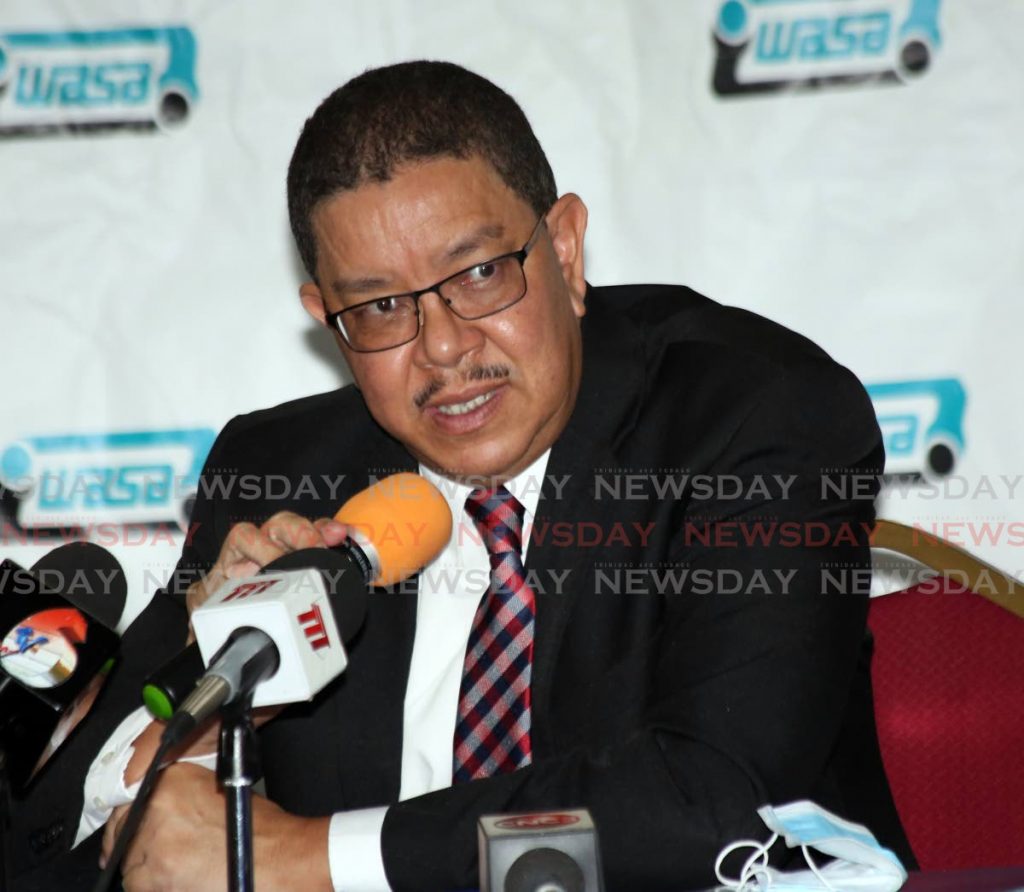WASA exploring increasing storage capacity

WASA said the authority is exploring expanding its storage capacity for surface water and tapping more groundwater sources to make up the rainfall deficit which occurs during every rainy season.
Acting CEO Alan Poon-King said the upcoming rainy season will enable the authority to increase production and supply of water, as 60 per cent of the water supplied comes from surface water, including reservoirs, rivers, rural intakes, etc. He said there has been a 20 per cent reduction in production from 242 million gallons per day to 200 million gallons per day.
He said the levels at the four major reservoirs going into the 2020 wet season are very low compared to the long-term average (LTA) capacity. The Hollis Reservoir is at 24.41 per cent (43.23 LTA), the Arena Reservoir is at 23.53 percent (53.08 LTA), the Navet Reservoir is at 29.26 per cent (58.04 LTA) and the Hillsborough Reservoir in Tobago is at 58.04 per cent (55.60 LTA). In almost all cases the Trinidadian reservoir levels are higher than at the same period last year, while the Tobagonian reservoir levels are slightly lower.
Communities which are experiencing a less than acceptable water service include areas from Manzanilla to Five Rivers, served by North Oropouche; Tacarigua and Maracas St. Joseph, served by the Caura and Llengo/Naranjo and Acono Plants respectively; and Santa Cruz, Morvant/Laventille, Belmont areas in North West, served by Caroni. Other areas served by the Caroni Plant include Chaguanas, Endeavour, Siparia, Longdenville, California, St. Mary’s in Central, as well as Debe, Penal and Siparia in South West. Customers in the Mayaro, Tableland and Barrackpore areas experience irregularity in their pipe borne water supply, due to distribution pipeline network constraints.
He said the hardest hit communities had been those at high points and the extremities of WASA’s distribution systems, including the Caroni Water Treatment plant and the North Oropouche Water Treatment Plant. In additions to monitoring and managing storage supplies to ensure the four main impounding reservoirs, WASA is closely monitoring and servicing existing wells. It has completed drilling of new wells in Granville and Arouca, and in Tobago, new wells were put into supply at Arnos Vale and Carnbee. It is maintaining its supply from the Point Lisas and Point Fortin Desalination Plants and ensuring that its plants are being repaired and maintained with minimum downtime, with new booster stations being completed at Savonetta and Freeman Road with upgrades at South Oropouche, Dow Village and Freeman Road.
Poon-King said wells are being drilled in Trinidad in Arouca, Arima, Santa Cruz and Tucker Valley, and in Tobago at Carnbee, Calder Hall and St. Mary’s Hill, which are anticipated to produce an additional 2.6 million gallons daily of water. All wells are projected to be in service by August 2020. He said while wells only benefit localised areas, more wells mean that the larger reservoirs will have to send less water to those areas.
He said WASA is continuing its efforts to reduce unaccounted-for water by addressing leak repairs and illegal water trucking and illegal connections. The Authority repaired 29,258 leaks in 2019 and 9,587 leaks in 2020 to date.
He reminded the public that it is illegal for any private water truck to fill up at a hydrant and proceed to deliver that water for a fee. He said illegal water connections also negatively affect its abilities to provide water to its legitimate customers.
Poon-King said TT’s average daily water consumption per capita is 82 gallons per day, as compared to the regional average of 46 gallons per day. He urged people to conserve water and reminded them that the water restrictions implemented in January 2019 are still in effect.
He said while the authority does not have enough meters to be able to say whether there has been an increase or decrease in volume of water used during the stay-at-home period, daily usage patterns have definitely changed. He said WASA is looking into bulk metering which would allow them to track flows in their network.
He said even though sanitation was a key part of curbing the spread of covid19, the public could conserve water by turning off the tap while washing hands and supermarkets, pharmacies, etc., that had installed taps for people to wash their hands could use low-flow taps.
Poon-King said He said WASA has also been redistributing water from unaffected areas with high pressures to more water stressed areas which has reflected in adjusted schedules to areas throughout TT. He said these schedules are posted on WASA’s website as soon as they are available, but they were difficult to manage with the reduction in supply and the fluctuations of supply and demand.

Comments
"WASA exploring increasing storage capacity"